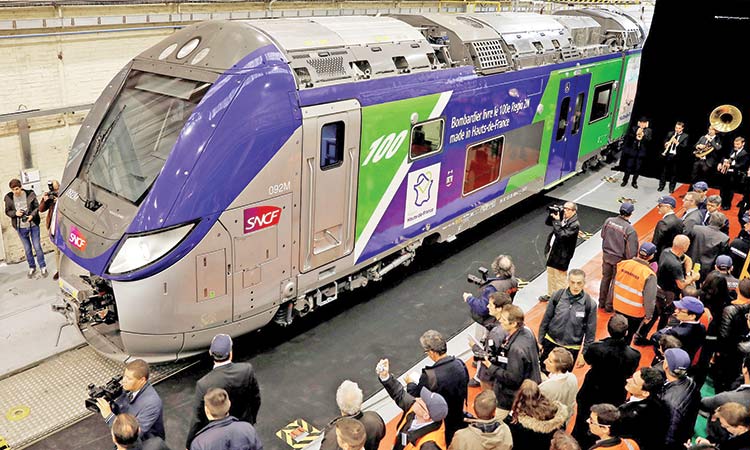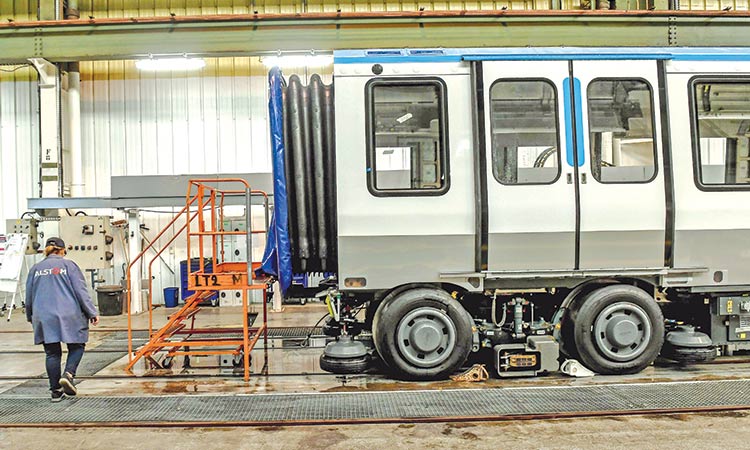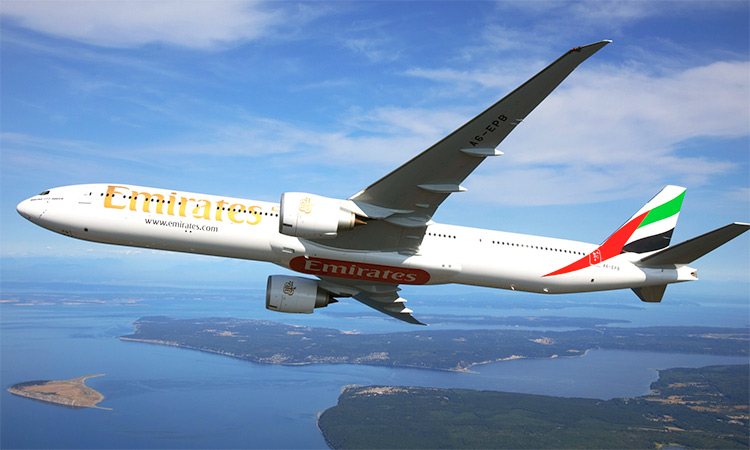Bombardier seeks rail partner

A Bombardier train at its factory in Crespin, France. Reuters
The Canadian manufacturer of planes and trains is working with Citigroup and UBS to strike a deal that could help create a rail champion to better compete with China’s state-backed operator, CRRC.
Rail companies are eyeing consolidation to reduce costs through scale in a market dominated by CRRC, the world’s largest train maker.
Bombardier has seen its share price plunge 37% since the start of the year after it flagged a 2019 profit warning on Jan.16.
It has been reviewing several rail merger scenarios in recent months which also involved a possible deal with Germany’s Siemens and a Chinese counterpart, but these options failed to gain traction, one of the sources said.
It remains in active talks with Alstom, one of its closest rivals in Europe, while also looking at Hitachi as another merger option, the sources said, requesting anonymity as the matter is confidential.
Bombardier, Alstom, Hitachi and Siemens all declined to comment.
Discussions with French industrial group Alstom began in July and became serious in September, one of the sources said.
The French government is open to a rail deal for Alstom but no final decision has been made on the terms of a potential transaction, another source said.
Alstom, advised by Rothschild, was only recently involved in a similar rail merger with Siemens - a deal set to create a European rail powerhouse but subsequently halted over antitrust concerns.
Berenberg analysts said that there would be less of a regulatory barrier to a deal between Alstom and Bombardier since the pair has a lower European market share in high-speed rail and signalling.
Japanese conglomerate Hitachi was also approached last year, the sources said, but it was not immediately clear whether the talks are still ongoing.
Hitachi’s biggest rail market in Europe is Britain where there is little overlap with Bombardier’s operations.
Yet both companies are active in Germany where concentration may raise concerns among European authorities, one of the sources said.
Bombardier’s selection of its preferred merger partner will ultimately hinge on the likelihood of winning antitrust approval and the remedies that can be offered to soothe competition concerns, the sources said.
European regulators are set to review two-decade old rules that determine if companies have the market power to hammer rivals - a move that could help Bombardier win consensus for its rail deal.
Bombardier sold 30% of its rail business to Canada’s second-largest pension fund, Caisse de depot et placement du Quebec, in 2015 after reviewing strategic options including a possible listing in Germany or Britain.
However, the unit has since struggled to cope with a handful of problematic rail contracts which have eaten into its margins, leading Bombardier to issue a profit warning for 2019.
The company recently slashed its guidance for its fourth-quarter earnings due to delays in business jet deliveries and higher rail costs.
The plane-and-train-maker, which has $9.7 billion in outstanding bonds according to Refinitiv data, faces growing pressure to quickly raise money from its transport unit, one of the sources said.
“They are serious about this. Without a deal the outlook is bleak,” he said.
Meanwhile, Bombardier warned its profit would be lower because of problematic rail contracts and said it might have to write down the value of a plane partnership with Airbus. The shares fell 37 per cent after the company expressed fears on earnings.
Bombardier, which sold control of the A220 narrowbody jet to Airbus in 2018 as part of a long-running drive to put it on a solid financial footing, said the venture needed more investment and might be subject to a writedown during fourth quarter results next month.
The company is shedding underperforming commercial plane programmes to focus on its more profitable business jet and rail units.
But Bombardier’s rail division, its largest unit by revenues, is wrestling with three rail projects in Europe, resulting in a $350 million charge. “Although Bombardier’s transportation segment has been volatile, cost problems out of Europe look worse than the market has been anticipating,” Citi analyst Stephen Trent said in a note to clients.
Bombardier now expects 2019 adjusted earnings before interest and taxes (EBIT) to be about $400 million, compared with a previously forecast range of between $700 million and $800 million. Free cash flow, a metric closely watched by investors, is expected to be negative $1.2 billion in 2019, compared with the previously forecast negative $500 million.
Shares fell as much as 38.6% to C$1.10 ($0.8436), the company’s biggest decline on record. The yield on Bombardier’s US dollar bond due March 15, 2025 surged more than 150 basis points to 8.4%.
Bombardier has $9.7 billion in outstanding bonds, according to Refinitiv data.
Bombardier also said it is “reassessing” its minority stake in the A220 jet programme, which will require additional cash to ramp up production.
Under the terms of the 2018 deal, Bombardier could oblige Airbus to acquire its 33.58% stake in the program in 2026 at market value or Airbus could oblige Bombardier to sell the stake. But Bombardier has previously said the parties are free to transact earlier if they both agree.
Airbus, which has a 50.6% stake in the A220 programme, said it remained committed to funding the jetliner on its way to profitability.
While some analysts see it as a negative for Airbus, others say the pain of putting up more money would be relatively small for the European planemaker compared with the long-term benefits of acquiring the A220.
The deal shores up Airbus’s position at the lower end of the narrowbody market where rival Boeing plans to expand by acquiring Brazilian planemaker Embraer’s commercial arm.
“Airbus have effectively acquired somewhere between $5 and $8 billion of R&D for a song; they have gained a market position that they would have never invested in; and they will have the ability in future to respond to changes in the market at a lower cost,” said Sash Tusa, aerospace analyst at UK-based Agency Partners.
Bombardier said the programme was “winning” with airlines, but would take longer to break even.
“This may significantly impact the joint venture value,” the company said, adding that it would disclose any writedown when it reports final fourth quarter and 2019 financial results on Feb.13.
Questions over the company’s stake in the A220 come as Bombardier is facing pressure to pay down its debt and bolster its rail unit, said a source familiar with the company’s thinking.
“It is a cash deployment question,” the source said.
A spokesman for the economy minister in the Canadian province of Quebec, which holds a 16.36% stake in the A220 program, declined to comment.
Bombardier also said delivery of four of its Global 7500 jets, which list for $73 million each, had now slipped into the first quarter of 2020.
Meanwhile, S&P Global Ratings and Fitch Ratings joined fellow credit rating agency Moody’s Investors Service to cut their outlook for Bombardier to negative from stable, a day after the company lowered its 2019 profit and cash flow outlook.
The Canadian company warned its 2019 profit would be lower, citing problematic rail contracts, challenges at its business transportation segment and the delayed delivery of its Global 7500 aircraft.
S&P said Bombardier’s weak outlook lowered its conviction that the company could generate positive free operating cash flow beyond 2019 which it believes is necessary for reducing debt.
The rating agency said it expects the free cash flow to be negative in 2020, with poor prospects for material improvement in 2021, and added that if this happened, there could be a further downgrade over the next 12 months.
Reuters







